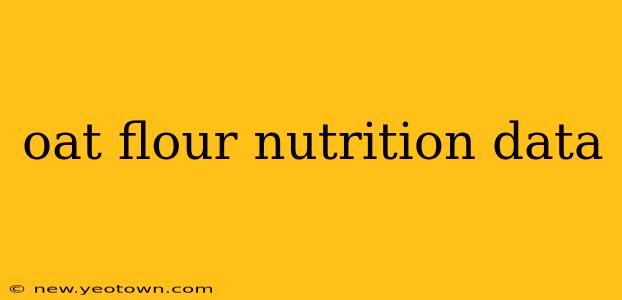Oat flour, a versatile and nutritious alternative to traditional wheat flour, has quietly risen in popularity among health-conscious bakers and cooks. But what exactly makes it so special? Let's delve into the nutritional profile of oat flour, exploring its benefits and addressing common questions. This isn't just a quick rundown; we'll explore the nuances of oat flour nutrition, going beyond simple calorie counts to understand its impact on your overall well-being.
What is Oat Flour Made Of?
Oat flour is simply finely ground oats. The type of oats used (rolled oats, steel-cut oats, etc.) will influence the texture and nutritional content slightly, but the foundation remains the same: whole grains of oats, processed into a powder. This simple process retains much of the oat's inherent nutritional value, unlike many refined flours.
Oat Flour Nutrition Facts (per 100g): A Detailed Breakdown
While exact values can vary slightly depending on the type of oats used and processing methods, a general nutritional profile for 100g of oat flour typically includes:
- Calories: Approximately 380-400 calories
- Protein: Around 15-17 grams
- Fat: Around 6-8 grams (mostly healthy unsaturated fats)
- Carbohydrates: Approximately 65-70 grams
- Fiber: A significant amount, ranging from 10-15 grams (this is a key benefit!)
- Vitamins and Minerals: Good source of iron, magnesium, zinc, and various B vitamins.
Is Oat Flour Gluten-Free?
This is a crucial question for many! While oats themselves are naturally gluten-free, cross-contamination during farming, processing, or packaging can introduce gluten. Therefore, always look for oat flour specifically labeled as "certified gluten-free" to ensure it's safe for those with celiac disease or gluten sensitivities.
How Does Oat Flour Compare to Other Flours?
Compared to white flour, oat flour boasts significantly higher levels of fiber, protein, and essential micronutrients. It's a richer source of nutrients, contributing to a more satiating and wholesome eating experience. However, it does have a slightly different texture, which requires adjustments in baking recipes.
What are the Health Benefits of Oat Flour?
The impressive nutritional profile of oat flour translates into several health benefits:
- Improved Digestion: The high fiber content promotes regular bowel movements and gut health.
- Better Blood Sugar Control: Oat fiber helps regulate blood sugar levels, making it beneficial for people with diabetes or those aiming to maintain healthy blood sugar.
- Increased Satiety: The fiber and protein content contribute to feelings of fullness, aiding in weight management.
- Heart Health Support: The soluble fiber in oats can help lower cholesterol levels.
Can I Substitute Oat Flour for All-Purpose Flour?
While you can substitute oat flour for all-purpose flour, it's not always a one-to-one swap. Oat flour tends to be denser and more absorbent than all-purpose flour, so you might need to adjust liquid quantities in your recipes. Experimentation is key! It works best in recipes where a slightly denser, chewier texture is desired, like muffins or pancakes.
Is Oat Flour Good for Weight Loss?
The high fiber and protein content of oat flour contribute to feelings of satiety, which can aid in weight loss efforts. However, it’s important to remember that oat flour, like any food, should be consumed as part of a balanced diet and healthy lifestyle.
How to Store Oat Flour?
Proper storage is essential to maintain the quality and freshness of oat flour. Store it in an airtight container in a cool, dark, and dry place. This will help prevent it from going rancid.
This comprehensive exploration of oat flour nutrition reveals its potential as a valuable addition to a healthy diet. Remember to always check labels and adjust recipes accordingly when incorporating this nutritious flour into your baking and cooking. Happy baking!

